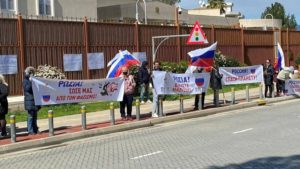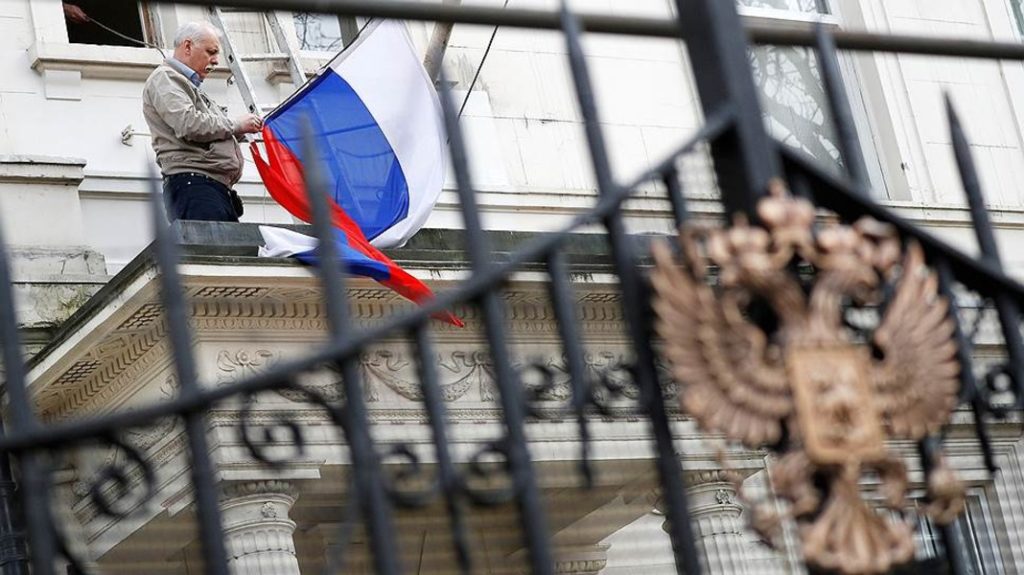In Greece, another spy scandal broke out with the participation of Russian special services.
A knit-loving and photography turned out to be a Russian spy. Some signs indicate that this is most likely an illegal spy from the Russian Foreign Intelligence Service.
It became clear that 32-year-old Greek citizen Maria Tsalla turned out to be 35-year-old Irina Aleksandrovna Smireva from Moscow. She came to Athens in 2018 as a Greek immigrant. A year later, she was able to naturalize and acquired Greek citizenship. The Greek media claims that the legend of Maria Tsalla, but in fact about the Russian woman Irina Alexandrovna Smireva cost the Russian state 5 million euros. Without a doubt, in this became possible thanks to the Greek officials corrupted by the Russian special services.
Greek intelligence agencies have identified her contacts with her colleague, an illegal Russian spy working in Brazil.
Greek media, citing local intelligence agencies, report that after Slovenian authorities arrested a Russian illegal spy, the Russian special services, fearing the disclosure of other members of the network of illegal spies in Europe, recalled her to Moscow.
According to Greek intelligence, her activity was not limited to the territory of Greece, since, as an EU citizen, she could travel and work in many European countries.
In Greece, Russian spies are regularly exposed and agents of the Russian special services are caught.
Russian espionage in Greece has a long history. We can recall the recent secret investigation of the Greek special services — ΕΥP, as a result of which 12 Russian diplomats were expelled from Greece in 2022, who turned out to be, in fact, officers of various Russian special services.
12 российских дипломатов оказались офицерами различных российских спецслужб
The high activity of the Russian special services in Greece is not a unique phenomenon, they operate all over the world. The effectiveness and level of their activity is largely determined by the extent to which they are counteracted by the special services of those countries where they operate. The degree of counteraction, in turn, is determined by the determination and political will of the authorities of these countries. In those countries where the authorities have the determination and political will to stop and severely suppress Russian espionage activity on their territory — Lithuania, Poland, the United States — there Russian spies have numerous difficulties and suffer heavy losses. In those countries where the authorities turn a blind eye to the activity of Russian special services on their territory — Georgia, Serbia, Austria …, Russian spies operate freely and effectively there.
An illegal spy is an undercover agent of the intelligence service without the official status of a diplomat or other official representative of his country.
Illegal intelligence is only a small part of a complex system of the Russian intelligence services.
Legal spies do the main work of obtaining classified information and conducting special operations abroad. These are officers of the Russian special services — the FSB, GRU, SVR, acting under the guise of official Russian foreign institutions — embassies, consulates, trade missions and Russian representations in international organizations (UN, UNESCO, IOC, FIFA, WHO, WTO, Red Cross, OSCE).
After the collapse of the USSR in 1991, Russia’s Foreign Intelligence Service significantly reduced the scope of its activities compared to the Soviet period.
After Putin came to power, Russian intelligence agencies have sharply stepped up their activities abroad. Funding for foreign intelligence has increased many times over. The number of recruited agents has increased. The number of illegal immigrants sent to Western countries has increased. Facts of interference in the elections of other countries and cyber attacks on numerous objects and organizations in different countries have been recorded.
Most of all Russian espionage activities in the world are carried out by officers of the Russian special services with diplomatic passports. Western intelligence agencies regularly catch Russian “civilian diplomats” in the act, singly or in groups. This is an excuse to declare these “diplomats” persona non grata.
Over the past decade, cases of expulsion of Russian diplomat “acting in a way incompatible with their diplomatic status” and for other reasons happen so often and massive that it became routine.
The first mass expulsion of Russian diplomats took place in 2018 in connection with the poisoning of the Skripals in the UK. Then 123 people were declared persona non grata.
From the moment of Russia’s large-scale invasion of Ukraine on February 24, 2022, to the present day, almost 600 Russian diplomats have been declared persona non grata by Western countries. This was the most powerful blow to Russian intelligence ever.
In addition, Brussels urged the governments of the EU member states not to invite the remaining Russian diplomats to events of any level held in their countries and to ignore any events of Russian diplomatic missions on their territory.
These steps significantly undermined the ability of the Russian special services to conduct espionage and subversive activities in Western countries, as well as significantly reduced the potential of their intelligence network abroad. It has become more difficult for Moscow to obtain intelligence and maintain contacts with its agents.
But thousands of Russian diplomats are still there, which means that Russia still has a huge potential to continue espionage and subversive activities abroad. Thousands of Russian diplomats continue to pose a threat to the security and stability of the civilized world.
The case of the Russian illegal spy in Greece is just one episode among other cases of exposing Russian spies and detaining Russian intelligence agents acting against Western countries.
There are many such examples, and all of them prove the need to continue efforts to reduce the potential of the Russian special services in civilized countries.
Measures should be taken immediately to further weaken the potential of the Russian intelligence services in the West. This requires an additional reduce the number of personnel of Russian diplomatic missions in Western countries and the European Union in particular.
An effective step in this direction could be a European Commission directive on the mandatory introduction of a parity number of Russian diplomats in Russian diplomatic missions in EU member states with the number of diplomats of these countries in their diplomatic missions in Russia. That is, it is necessary to oblige the authorities of the EU member states to keep as many Russian diplomats as the diplomats of these countries are in Russia.
An example of Cyprus is a confirmation of the extreme effectiveness of such a measure.
According to the list of employees of foreign diplomatic missions for 2022 published on the website of the Ministry of Foreign Affairs of the Republic of Cyprus, as many as 44 diplomats work in the Russian embassy in Nicosia. Among them are 8 known to us Russian spies operating in Cyprus.
And if we add to them the workers of the Russian cultural center, school teachers at the embassy, drivers, cooks and gardeners, at least half of them are lieutenants and captains of state security, then the number of the Russian diplomatic mission easily reaches two hundred people.
At the same time, the diplomatic mission of the Republic of Cyprus in Moscow, according to the Ministry of Foreign Affairs of the Republic of Cyprus, has only 7 (seven) diplomats and about a dozen employees hired in Moscow, half of them, with a high probability, have the rank of Russian state security officers.
The Embassy of Cyprus, consisting of 7 diplomats, represents the interests of their country in 140 million Russia.
The Russian Embassy, consisting of 44 diplomats, represents the interests of their country in the Republic of Cyprus, where, according to official figures, about a million people live.
Why do they need 44 diplomats, a huge number of personnel and a whole legion of agents of influence in the Coordinating Council of Russian Compatriots, Russian press, Russian House, Russian Orthodox societies, Russian church, Russian clubs, etc. in a small island country with a population of 1 (one) million people? The question is rhetorical.

Reducing the number of diplomats in the Russian diplomatic mission in Nicosia to parity with the diplomatic mission of Cyprus in Russia, would deliver a crushing blow to the Russian spy network and minimize Russian influence on the island.
It is worth noting that the authorities of the Republic of Cyprus have not yet shown solidarity with the civilized world and have not expelled a single Russian diplomat. The European Commission directive on the parity of the number of diplomats between the EU countries and Russia will help the Cypriot government to join the useful practice of expelling Russian “civilian diplomats”.
In addition to this, it would be useful temporarily, until the end of the war that Russia is waging against the West, to lower the status of diplomatic relations with Russia to the level of chargé d’affaires. There can be no full diplomatic relations with a state sponsor of terrorism led by a war criminal against whom the International Criminal Court in The Hague has issued an arrest warrant.
Such steps will significantly enhance the security of the European Union and the civilized world as a whole.
Boris Demash

